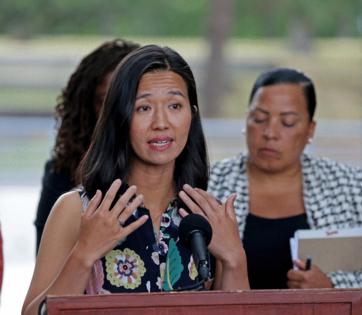Boston Mayor Wu directs $5 million to 3 poorest neighborhoods to close 20-year life expectancy gap
Published in News & Features
BOSTON — The Wu administration is directing $5 million in grant funding toward community organizations with the aim of narrowing a life expectancy gap in three low-income neighborhoods where residents die about 20 years sooner than wealthier parts of Boston.
The grant funding was doled to out to four community-led coalitions “to build wealth and economic security” in Dorchester, Roxbury and Mattapan, as part of a partnership between Mayor Michelle Wu, the Boston Public Health Commission, and the Atrius Health Equity Foundation, the mayor’s office said Monday.
The city has outlined a goal to close its life expectancy gap by 2035. Residents who live in Back Bay, one of the city’s wealthiest neighborhoods, live on average 92 years, while residents who live in majority-Black Roxbury, Dorchester and Mattapan, die an average of 23, 20 and 18 years sooner, respectively, according to Boston Public Health Commissioner Bisola Ojikutu.
“We have concerning disparities by race and ethnicity,” Ojikutu said at a press conference held Monday at the Codman Square Health Center in Dorchester. “We believe that how long you live should not depend upon your race, your ethnicity or your zip code. All Bostonians should live long, healthy lives.”
Ojikutu said life expectancy among black people as a whole is seven years lower than other Boston residents. The lowest life expectancy in the city is among black men, who live on average 10 years lower than any other men.
“None of these data are new, and they’re not unique to Boston,” Ojikutu said. “This is a national tragedy and it deserves the attention that we here in Boston are going to put forth to close these gaps.”
Ojikutu said the city is relying on partnerships to help close the life expectancy gap, and is banking on strategies to help residents in those three majority-Black and low-income neighborhoods become “economically secure.” By doing that, she said, the residents will have better access to healthcare and avoid chronic diseases.
Cardiometabolic diseases, including diabetes, heart disease and other related disorders, are among the top three leading causes of death before the age of 65 in Boston and “disproportionately impact communities of color,” the mayor’s office said, adding that poverty, insufficient housing and hunger are contributing factors.
Boston’s median household income between 2019 and 2023 was $94,755, per recent data from the American Community Survey, as reported by the Boston Community Health Collaborative. That median figure, however, is reflective of stark “disparities” between different neighborhoods, the mayor’s office said.
Roxbury reported the lowest median income at $49,921, while South Boston and the Seaport were highest at $162,257. Median income is highest among white residents, at $131,953, and lowest among Black residents, at $58,628, followed by Latino residents, at $53,873, according to the mayor’s office.
Data show 17% of Boston residents are living in poverty. Mattapan has the highest percentage of children under 5 years old living below the poverty line, at 34%, city officials said.
Ojikutu said the grant funding is responsive to a community needs assessment performed by the city, which found that “people need more resources.”
“People are living day-to-day, paycheck-to-paycheck,” Ojikutu said. “Some need to make tradeoffs to afford essentials like housing and groceries while struggling to manage care for children. This is unacceptable, and particularly here in Boston, this resource–rich city that we live in, this is not the way that we’re going to have things happen. Our residents need more opportunities.”
The $5 million in grant funding is being distributed to four partnerships that encompass 12 organizations. It is the first of two rounds of $10 million in funding that has been committed to Boston by the Atrius Health Equity Foundation, with the other round set to be released by the foundation in 2028.
Recipients this time around include the Boys and Girls Clubs of Boston, health centers, a food co-op in Dorchester, and organizations that work with immigrants.
Targeted work will involve screening for financial health assistance eligibility, English language instruction and career training for health and education fields, financial coaching, credit-building and other economic mobility services, and food distribution and primary care outreach van services, among other assistance, the mayors’ office said.
“We know that empowering all of our residents to live long, healthy lives filled with joy takes more than investing in health care,” Mayor Wu said. “It means investing in what makes people healthy — housing, access to nutritious food, economic mobility. These are the types of investments that we are proud to make in the city every single day, and it’s important to know that we are making them because it is urgent and there is more need for this than ever in this moment.”
The mayor said the city is “doubling down in the face of a federal administration that is clawing back access to critical life-changing resources, that’s canceling research that will save lives, who passed a bill that is certainly not beautiful but will cut back Medicaid coverage for thousands of residents and slash funding for community health centers.”
“And so, as the need grows greater, as the urgency grows greater, as the resources can be few and far between, coming from the federal level, here in Boston, we are determined to continue pressing forward,” Wu said. “We will hold ourselves to a high standard, and that’s why we’re making our city a home for everyone, not just the rich and powerful.”
_____
©2025 MediaNews Group, Inc. Visit at bostonherald.com. Distributed by Tribune Content Agency, LLC.







Comments